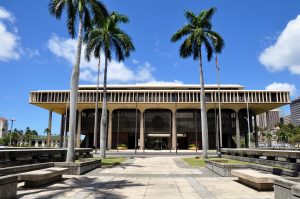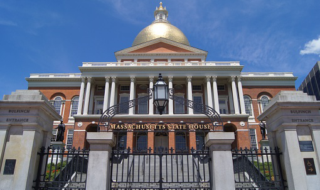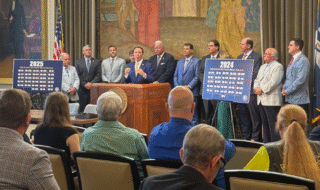March 7, 2024 Last Edit: July 23, 2024
NFIB State Director Michael Iosua reports on the small business agenda from the State Capitol.

March 7 was the Hawaii State Legislature’s First Crossover Deadline, the last day in which bills can pass three readings and emerge from the originating chamber, then cross over to the non-originating chamber.
Bills that do not meet the three-reading requirement in the originating chamber by the First Crossover Deadline will not proceed through further discussions during the 2024 legislation session.
In furtherance of NFIB Hawaii’s policy priorities, the legislative team has worked with committee chairs and other members of the Hawaii State Legislature to prevent harmful legislation. The team has been successful in having many of the harmful bills either deferred or otherwise defeated for this session. Below is a summary of the status of NFIB Hawaii’s priority bills.
Dead Bills
Family Leave
- HB 1658/SB 2046 – Relating to Family Leave – Requires DLIR to administer a family leave insurance program. Extends the family leave period to 16 weeks and eliminates the 100-employee threshold for applicability. The bill was not scheduled for hearing.
- HB 1659/SB 2047 – Relating to Paid Sick Leave – Requires employers to provide a minimum amount of paid sick leave to employees to care for themselves or an ill family member and supplemental paid sick leave to employees with public health emergency conditions. The bill was not scheduled for hearing.
- HB 1768 – Relating to Family Leave – Requires DLIR to administer a family leave insurance program. Extends the family leave period to 16 weeks and eliminates the 100-employee threshold for applicability. The bill was not scheduled for hearing; the Senate companion, SB 2474, is still live.
- SB 2930 – Relating to Employee Benefits – Extends the family leave period for up to eight additional weeks for employees when the birth of a child requires them to stay in a neonatal intensive care unit and requires the Civil Rights Commission to amend its rules to include neonatal care as a related medical condition. The bill did not meet the First Crossover Deadline; the House companion, HB 2552, is still alive.
UI Benefits for Striking Workers
- HB 1785/2188 – Relating to Unemployment Benefits – Allows striking workers to be eligible for unemployment benefits. These bills were deferred.
- SB 2663 – Relating to Unemployment Benefits – Authorizes unemployment benefits to employees who are not working due to a strike or other labor dispute if the HLRB determines that the employer is failing to make good faith efforts to negotiate. This bill was not scheduled for hearing.
- SB 2941 – Relating to Fair Scheduling – Establishes provisions for unemployment benefit rights when claimants are unemployed due to a strike or industrial controversy. This bill was not scheduled for hearing.
Green Fee
- SB 2357 – Relating to Green Environmental Fees – Establishes a Green Environmental Fee Program that requires certain users to purchase an annual license for the use of a state beach, park, forest, trail, or other natural area on state land. This bill was not scheduled for hearing.
Data Privacy
- SB 2581 – Relating to Privacy – Establishes provisions allowing for consumers to request certain data brokers or users to delete any personal information related to the consumer. This bill was not scheduled for hearing.
- SB 2012 – Relating to Online Privacy for Children – Requires a business that provides an online service to be accessed by children to comply with certain data privacy requirements, complete a data protection impact assessment which would be available to the Attorney General and prevents the business from taking certain proscribed actions. This bill was deferred by the committees.
Miscellaneous Priority
- HB 2536 – Relating to Single-Use Plastics – Prohibits certain businesses from using, selling, or distributing disposable or single-use food ware and beverage service items after January 1, 2025. This bill failed to make the crossover deadline.
- SB 2059 – Relating to Accessibility – Requires a retail establishment with an employee toilet facility to allow a customer with certain medical conditions to use that restroom during normal business hours, under certain conditions. Exempts a retail establishment and employees from civil liability for use of the restroom. This bill was not scheduled for hearing.
- SB 2784 – Relating to Tipped Employees – Repeals the authority of employers to pay tipped employees less than the minimum wage. This bill was deferred by the LBT committee.
- SB 2877 – Relating to the Tip Credit – SB 2877 abolishes the tip credit. The bill was not scheduled for hearing.
- SB 3249 – Relating to Currency – Requires retail merchants to accept cash payments. This bill was not scheduled for hearing.
- SB 2933 – PROPOSING AN AMENDMENT TO ARTICLE I OF THE CONSTITUTION OF THE STATE OF HAWAII TO RECOGNIZE AND PROTECT THE INHERENT AND INALIENABLE RIGHT OF ALL PEOPLE TO CLEAN WATER AND AIR, A HEALTHFUL ENVIRONMENT AND CLIMATE, HEALTHY NATIVE ECOSYSTEMS, AND BEACHES – Proposes a constitutional amendment to ensure clean water and air, a healthful environment and climate, healthy native ecosystems, and beaches, shall be protected and shall not be infringed. The bill failed to make the crossover deadline.
Live Bills
Family Leave
- HB 2552 – Relating to Minimum Wage – Extends the family leave period for up to eight additional weeks for employees when the birth of a child requires them to stay in a neonatal intensive care unit and requires the Civil Rights Commission to amend its rules to include neonatal care as a related medical condition. Senate companion, SB 2930, was not scheduled by the WAM committee and failed to meet the crossover deadline.
- HB 2757 – Relating to Paid Family Leave – Requires DLIR to establish a family and medical leave insurance program and begin collecting payroll contributions to finance payment of benefits by January 1, 2027 and paying benefits by the following year. Specifies eligibility requirements and employee protections under the program.
- SB 2474 – Relating to Family Leave – Requires DLIR to administer a family leave insurance program. Extends the family leave period to 16 weeks and eliminates the 100-employee threshold for applicability. House companion, HB 1768, was not scheduled for hearing.
Green Fee
- HB 2081 – Relating to Government – Amends the TAT rate and requires a $20 TAT for each night in which a transient accommodation is furnished in exchange for points, miles, or other amounts provided through a membership, loyalty, or rewards program. Appropriates funds to DLNR for protection, management, and restoration of the State’s natural resources.
Privacy
- SB 2695 – Relating to Privacy – Adds definitions of “identifier” and “specified data element” and amends the definition of “personal information” for the purposes of notifying affected persons of data and security breaches under existing state law that governs the security breach of personal information. Includes licensees subject to the Insurance Data Security Law, article 3B, chapter 431, Hawaiʻi Revised Statutes, among the businesses deemed compliant with security breach notice requirements under existing state law.
Miscellaneous
- HB 1897 – Relating to Single-Use Plastics – Prohibits lodging establishments from providing personal care products in small plastic containers in transient accommodations. Senate Companion, SB 2576, was not scheduled for hearing.
- SB 2020 – Relating to Deceptive Trade Practices – Makes it a deceptive practice to advertise, display, or offer a price for goods or services that does not include all mandatory fees or charges, with certain exceptions.
- SB 2715 – Relating to Unfair Labor Practices – “Captive audience” bill. Makes it unlawful for an employer to discharge, discipline, or otherwise penalize or threaten any adverse employment action against an employee because the employee declines to attend or participate in an employer-sponsored meeting that communicates the opinion of the employer about political matters, or declines to receive or listen to a communication from the employer that communicates the opinion of the employer about political matters.
NFIB is a member-driven organization advocating on behalf of small and independent businesses nationwide.
Related Articles














